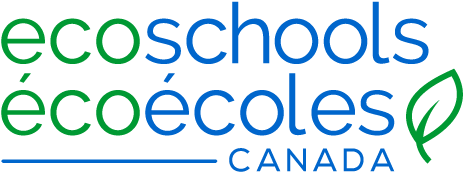
Ontario EcoSchools works with schools on a daily basis and our staff is keenly aware of health and wellness trends among children and youth. This includes rising stress levels, declining regular physical activity, increased screen-time, and an increasing disconnect from nature. At the same time, there is a growing body of research that links environmental education to positive physical and mental health outcomes.
However, these links are not always clear in daily educational practices. For instance, research shows time spent in nature can improve health, but teachers often do not receive the training to feel confident to take students outside. Mandated health and physical education is not allotted enough time during the week, and campaigns such as active transportation, healthy food, and civic engagement are seen as extra-curricular – which can make it difficult to integrate into the classroom.
By connecting well-being to the EcoSchools program, the resources below can help incorporate healthy habits, physical activity and mental health into all aspects of classroom life. As an easy guide, we have linked to the resource, given a short description of how it connects to well-being, and listed the section where the activity can be claimed.
1. PHYSICAL WELL-BEING
Physical well-being is defined by the growth and development of the body and is affected by physical activity, sleep patterns, healthy eating and healthy life choices.
Ontario EcoSchools resources connected to physical well-being:
- [FDK] Nature Walk: helps to promote physical activity, getting outdoors, and connecting to nature. (Curriculum)
- [FDK] Nature Scavenger Hunt: helps to promote physical activity, getting outdoors, and connecting to nature. (Curriculum)
- Local Food Kit : assists in getting students, classrooms, and the whole school community learning about healthy eating and good food choices. (Teamwork and Leadership, School Ground Greening, Curriculum, Environmental Stewardship)
- Active Transportation Campaign Kit : helps get students, classrooms, and the whole school community learning about active transportation and the benefits of physical activity. (Teamwork and Leadership, Curriculum, Environmental Stewardship)
- School Grounds Clean-Up: promotes getting outside and active in order to care for personal health and the health of the environment. (Teamwork and Leadership, Curriculum, Environmental Stewardship)
2. COGNITIVE WELL-BEING
Cognitive well-being includes the development of abilities and skills such as critical thinking, problem solving, creativity, and the ability to be flexible and innovative.
Ontario EcoSchools resources connected to cognitive well-being:
- [FDK] Creating Environmental Artwork: promotes critical thinking and creativity to make environmental art. (Curriculum)
- [Grade 2] Air and Water in the Environment: promotes critical thinking and problem solving when learning about water and air pollution. (Curriculum)
- [Grade 7] Ecological Footprint: How can we tread a little lighter on the planet?: helps develop critical thinking, problem solving and creativity when learning about our ecological footprints. (Curriculum, Environmental Stewardship)
- [Grade 7] Trapping Energy: Building a Solar Oven: promotes critical thinking, problem solving and creativity when learning about solar energy. (Curriculum)
- [Grade 8] Informed Consumers: The Environmental Talk Show : promotes critical thinking, problem solving and creativity when researching an environmental issue chosen by students. (Curriculum)
- [Grade 9] Mapping Ecotourism and Climate Change in Canada: develops critical thinking, problem solving, and innovation when determining the impacts of climate change on tourism in Canada. (Curriculum)
- [Grade 12] Research Activity: The Impacts of Environmental Disturbances on the Population Dynamics of an Ecosystem: helps to promote research skills and evaluating impacts. (Curriculum)
- [Grade 12] Population Dynamics: promotes research skills, critical thinking, and problem solving. (Curriculum)
3. EMOTIONAL WELL-BEING
Emotional well-being is the ability to learn about and experience emotions, and understand how to recognize, manage, and cope with them. This can include developing confidence, purpose and resilience, and a sense of empathy.
Ontario EcoSchools resources connected to emotional well-being:
- [Grade 2] Nearby Nature: Rock Doves: promotes developing a sense of empathy, understanding and caring for non-human, sentient beings. (Curriculum)
- [Grade 10] Who Cares? Environmental Activist Bulletin Board: promotes understanding the ways that people can effect change in the world, and how to communicate intentions effectively. (Teamwork and Leadership, Curriculum)
- [Grade 10] How to Change the World: Interview with an Environmental Activist: promotes ability to confidently connect with change-makers in the world, and share a sense of purpose via developing interview skills. (Curriculum)
4. SOCIAL WELL-BEING
Social well-being involves the development of self-awareness, including a sense of belonging, collaboration, relationships with others, and communication skills.
Ontario EcoSchools resources connected to social well-being:
- [Grade 3] Pioneer Life: helps to develop self-awareness in relation to pioneers and historical life and livelihoods. (Curriculum)
- [Grade 4] Shrinking Habitat – Share the Space: promotes self-awareness and communication skills when learning about habitat loss and the impact this has on various species. (Curriculum)
- World Water Day: Create a Media Campaign: provides tips on working collaboratively to raise awareness about the importance of conserving water and other natural resources. (Teamwork and Leadership, Curriculum, Environmental Stewardship)
- Climate Leadership Toolkit : helps to develop self awareness, collaboration and communication skills by working with an EcoTeam or class to run a whole school campaign. (Teamwork and Leadership, Energy Conservation, Waste Minimization, Curriculum, Environmental Stewardship)
- Water Awareness and Action Campaign Kit: helps develop self awareness, collaboration and communication skills by working with an EcoTeam or class to run a whole school campaign. (Teamwork and Leadership, Curriculum, Environmental Stewardship)
- The Great Lakes: Learning & Action Resource: helps develop self awareness, collaboration and communication skills by working with an EcoTeam or class to run a whole school campaign. (Teamwork and Leadership, Energy Conservation, Waste Minimization, School Ground Greening, Curriculum, Environmental Stewardship)
- Earth Hour Campaign Kit: helps develop self awareness, collaboration and communication skills by working with an EcoTeam or class to run a whole school campaign. (Teamwork and Leadership, Energy Conservation, Curriculum, Environmental Stewardship)

Recent Comments